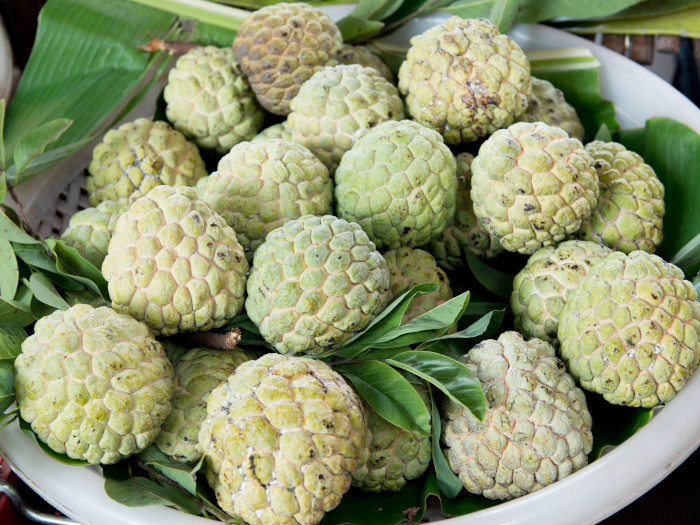For those who have never eaten a custard apple, this is a delightful exotic fruit with quite a few important nutrients, a unique taste, and various impressive health benefits.
What is a Custard Apple?
A custard apple is a tropical fruit that is native to Central America and parts of South America, scientifically known as Annona reticulata. Closely related to the soursop, sugar apple, and various citrus fruits, this unique fruit grows on a shrub of the same name and may be called sharifa or sitaphal (India) or bullock’s heart, depending on where in the world you happen to be. The fruit grows from different ovaries that coalesce into one fruit, which is slightly larger than a sugar apple and has a rough exterior. It is vaguely heart-shaped and has a variety of cultivars, meaning that it can be a number of different colors, including maroon, green, brown or yellow. [1]
The fruit of the custard apple is soft and mealy and is best eaten with a spoon, after removing the numerous black seeds. The consistency of the fruit is what gives it the name “custard”, and it has a tangy and sweet flavor. This fruit has been popular in tropical areas of the world for centuries but has only recently been spread to much of the western world.

Deseeding custard apple is time-consuming work but totally worth it. Photo Credit: Shutterstock
Serving Size : Nutrient Value Water [g] 71.5 Energy 101 Energy [kJ] 423 Protein [g] 1.7 Total lipid (fat) [g] 0.6 Ash [g] 1 Carbohydrate, by difference [g] 25.2 Fiber, total dietary [g] 2.4 Calcium, Ca [mg] 30 Iron, Fe [mg] 0.71 Magnesium, Mg [mg] 18 Phosphorus, P [mg] 21 Potassium, K [mg] 382 Sodium, Na [mg] 4 Vitamin C, total ascorbic acid [mg] 19.2 Thiamin [mg] 0.08 Riboflavin [mg] 0.1 Niacin [mg] 0.5 Pantothenic acid [mg] 0.14 Vitamin B-6 [mg] 0.22 Vitamin A, RAE [µg] 2 Vitamin A, IU [IU] 33 Fatty acids, total saturated [g] 0.23 Tryptophan [g] 0.01 Lysine [g] 0.04 Methionine [g] 0 Sources include : USDA [2]
Custard Apple Nutrition
Custard apple possesses quite a few nutrients, including high levels of vitamin C and vitamin B6, as well as calcium, potassium, magnesium, and iron. There are no fats or cholesterol found in the fruit, and most of its calories (101 calories per 100 grams) comes from carbohydrates. Finally, there are various polyphenolic compounds found in this fruit with serious antioxidant potential, furthering boosting the value of this fruit in your diet. [3]
Custard Apple Health Benefits
The essential health benefits of custard apple include its ability to improve the appearance of the skin, boost hair health, strengthen the immune system, protect the brain, and benefit pregnancy, among others.
Skin Care
There are a good number of polyphenolic antioxidants in custard apple, which makes it an ideal solution for people who want to protect themselves against free radical damage. This can help to eliminate the signs of aging, such as wrinkles and age spots, as well as increasing skin elasticity to reduce the signs of aging. [4]
Hair Care
By regularly consuming this mineral-rich fruit, you can boost the strength of your hair, while also enjoying the beneficial effects of vitamin C. Collagen is essential for every part of the body, and vitamin C is required for its production, so this fruit can definitely help your hair loss and dandruff issues. [5]
Anti-cancer Potential
While human studies are required to explore the full potential of the anti-cancer properties of custard apple, animal studies have shown that custard apple pulp can inhibit the proliferation of prostate cancer cells. A 2016 research study by Gagan Deep et al. published in Scientific Reports studied the effects of the pulp on laboratory mice and concluded that custard apple (graviola) pulp could be developed for chemo-prevention use in normal/high-risk individuals as well as for intervention in prostate cancer patients. [6]
Improves Vision
Beta-carotene is found in limited quantities in custard apple, but with the other nutrients and antioxidants present in this fruit, regular consumption can help boost vision. This includes lowering your risk of macular degeneration and slowing the advance of cataracts as you age. [7]
Treats Diabetes
There is a very high level of dietary fiber found in custard apple, which can significantly slow down the release of insulin into your body, in response to the intake of sugar. This regulation is perfect for diabetic patients, who need to be mindful of their balance between glucose and insulin at all times. [8]
Prevents Arthritis
Studies have found certain anti-inflammatory properties in this unique apple, meaning that it can help to soothe the pain of arthritis, while also cutting down on inflammation in the gut and cardiovascular system. [9]
Boosts Immunity
There is an impressive amount of vitamin C in custard apple, which is a major kickstart for the immune system. Vitamin C can help to stimulate the production of white blood cells, which are the first line of defense for the body’s immune system. [10]
How to Eat a Custard Apple?
The easiest way to eat a custard apple is to simply slice it in half, revealing the central area that is usually filled with seeds. Then, scoop out the creamy flesh with a spoon, if you want to eat the fruit raw, and discard the seeds. You can also prepare various desserts with custard apple, as well as include it in fruit smoothies and as a topping for tarts and pies.
